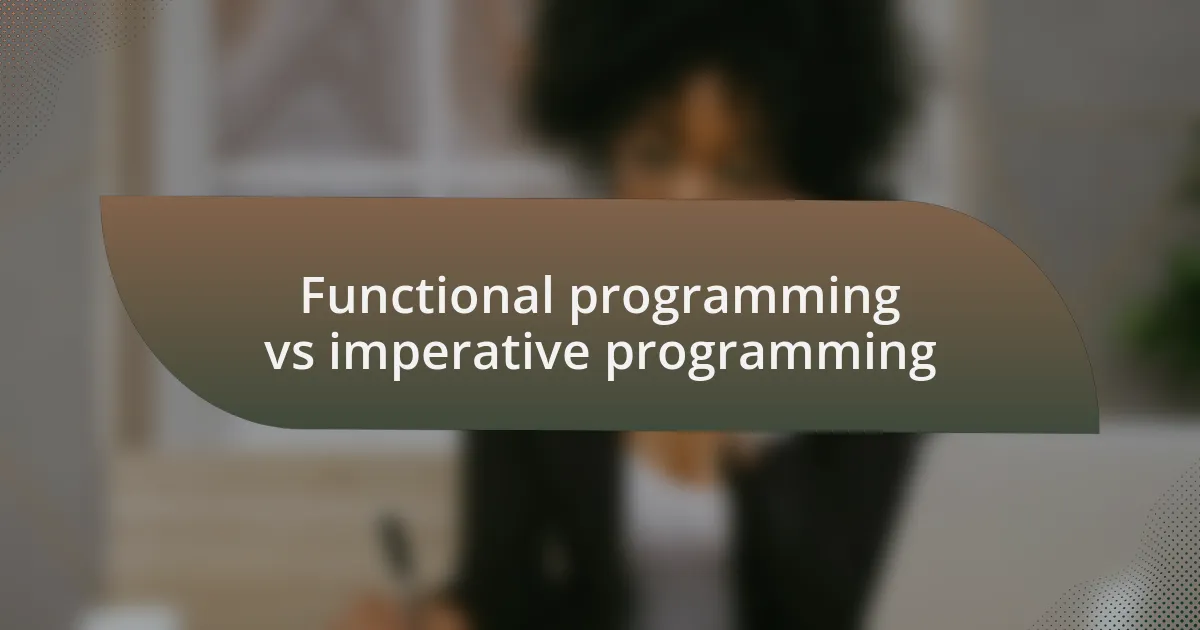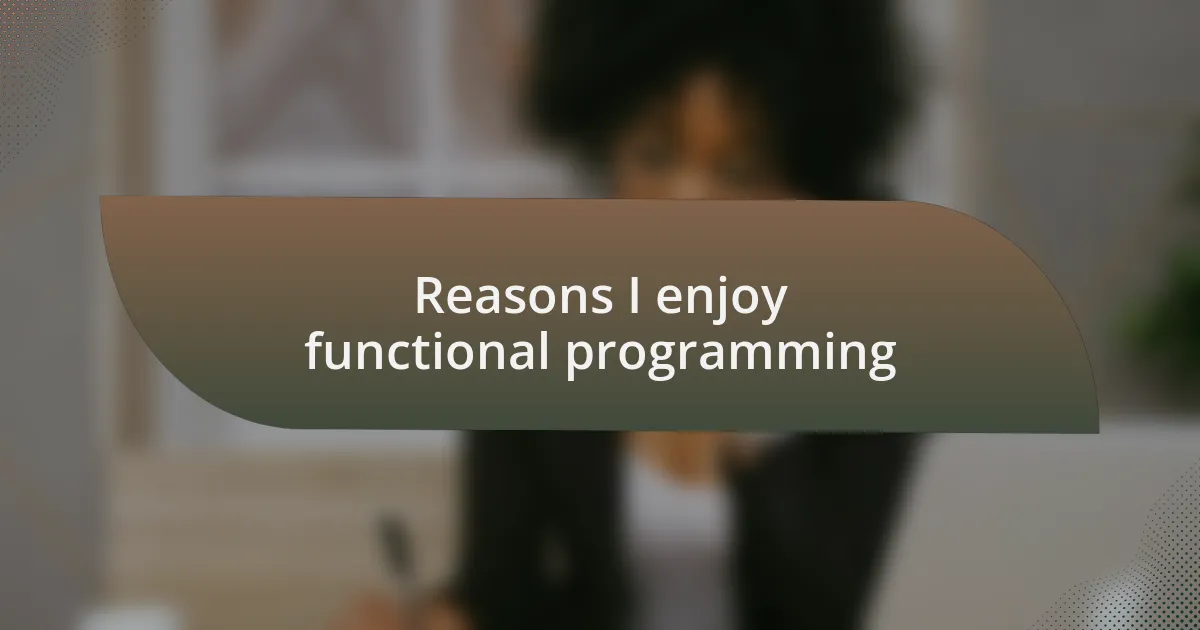Key takeaways:
- Functional programming’s emphasis on immutability simplifies debugging and provides a more predictable coding environment.
- Pure functions enhance code reliability, leading to easier testing and reasoning about behavior.
- Higher-order functions transform problem-solving by allowing functions to be used as arguments and return values.
- Functional programming excels in data analysis, scalable web applications, and enhances concurrency, leading to cleaner and maintainable codebases.

Understanding functional programming benefits
One of the standout benefits of functional programming is its emphasis on immutability, which I find liberating. When I first started using functional programming languages, I was surprised by how much easier it made debugging. Without the worry of variables changing unexpectedly, it felt like I was stepping into a more predictable world of code.
Another significant advantage is the ability to compose functions. I remember the first time I realized that I could build complex operations by simply combining simpler ones. This approach not only encouraged cleaner code but also fostered a deeper understanding of the problem at hand. Isn’t it satisfying to see how elegantly everything can come together?
Lastly, I appreciate how functional programming promotes first-class functions. This feature allows functions to be treated like any other variable, which can change the way you think about program structure. Reflecting on my journey, I’ve seen how this flexibility opens up creative solutions to problems that once seemed daunting. How has embracing functional programming reshaped your approach to coding?

Key principles of functional programming
One of the core principles of functional programming is pure functions, which I’ve come to greatly value in my coding experience. These functions always return the same result given the same input, allowing for easier testing and reasoning about code behavior. The first time I used them, it felt like giving my code a new level of reliability—like having a dependable friend who you can always count on.
Another key principle is higher-order functions, which truly transformed my approach to problem-solving. I remember encountering a coding challenge that seemed overwhelming at first. But as I started utilizing higher-order functions, I discovered how I could treat functions as arguments and return them from other functions. This not only streamlined my code but also revealed new patterns I hadn’t considered before. Have you experienced a similar ‘aha’ moment while exploring this concept?
Lastly, recursion stands out as both a powerful tool and a slightly daunting one at first. Initially, the idea of functions calling themselves felt alien, but I soon realized it enabled me to tackle complex problems in a remarkably elegant way. The first successful recursive function I wrote felt like cracking a code, opening the door to an array of solutions I never thought possible. It’s like unlocking a new level in a game—what challenges could you conquer with this skill in your toolkit?

Functional programming vs imperative programming
While functional programming emphasizes immutability and pure functions, imperative programming focuses on changing program state through statements. I recall the moment I first encountered imperative programming, and it reminded me of writing step-by-step instructions for a recipe. I could feel the clarity in telling the computer what to do at each stage, but I often struggled with keeping track of changing variables, which felt a bit like juggling.
In contrast, I find that the functional programming paradigm allows me to think more abstractly about problems. A while back, I was faced with a complicated data transformation task, and using a functional approach simplified the entire process. Instead of sprawling through a long sequence of updates and changes, I could chain functions together, resulting in cleaner and more understandable code.
The challenge with imperative programming often lies in debugging; it can sometimes feel like trying to find a needle in a haystack. I vividly remember spending hours tracing through lines of code to figure out where a variable had taken a wrong turn. Meanwhile, when I apply functional programming, the focus on function purity often leads to fewer side effects and, ultimately, a more maintainable code base. Isn’t it reassuring to know that you can structure your code in a way that lends itself to easier debugging and modifications later on?

My journey into functional programming
My journey into functional programming began somewhat unexpectedly. I remember sitting in a software development class where the instructor introduced us to Haskell. At first, the syntax felt foreign and intimidating, akin to deciphering a new language. Yet, there was an exhilarating moment when I realized how cleanly I could express my ideas. It sparked a desire in me to explore this paradigm further.
As I delved deeper, I started to appreciate the elegance that functional programming brings to problem-solving. One particular project stands out: I had to implement a complex algorithm under a tight deadline. When I applied functional techniques, I was amazed at how quickly I could prototype a solution. The sense of accomplishment when everything clicked into place was profound—like completing a beautiful puzzle where each piece fit seamlessly.
Reflecting on my experiences, I often ask myself: why isn’t everyone using functional programming? The clarity and structure it provides almost feel like a breath of fresh air amidst the chaos of software development. It’s a transformation that not only improved my coding skills but also reshaped my approach to thinking about problems in general. Each day that I use functional programming, I feel more empowered to tackle any challenge that comes my way.

Reasons I enjoy functional programming
There’s something exhilarating about the emphasis on immutability in functional programming. I remember the first time I realized I could trust my data not to change unexpectedly. It was a game changer! Suddenly, bugs that seemed elusive in imperative languages became far less frequent, freeing my mind to focus on crafting better algorithms instead.
One aspect that truly resonates with me is how functional programming encourages pure functions. The idea that a function’s output will always be the same for a given input brings a sense of predictability that I find refreshing. I recall tackling a data transformation task where using pure functions made my code not only cleaner but also intuitive. It felt like I was building a system of reliable building blocks, each one working with clarity and purpose.
Moreover, I enjoy how functional programming fosters a different way of thinking about problems. A specific instance was during a team hackathon when I opted for a functional approach to handle asynchronous tasks. The creative freedom it provided opened up new avenues for collaboration with my teammates. I often wonder, isn’t it exciting how a shift in perspective can lead to breakthrough solutions? This ability to reframe challenges is something that makes functional programming particularly appealing to me.

Practical applications of functional programming
When it comes to real-world applications, functional programming shines in data analysis and processing. I once tackled a hefty dataset for a project, using a functional programming language to filter and transform the data seamlessly. The concise nature of functions allowed me to compose complex operations without muddling my code—each step was like a smooth transition in a well-choreographed dance.
Another area where functional programming excels is in building scalable web applications. I recall a team project where we needed to manage user sessions and handle multiple requests efficiently. By employing a functional approach, we could leverage higher-order functions to streamline our codebase. It felt almost magical to see how clean and maintainable the architecture turned out, making future updates less daunting. Have you ever experienced that satisfying moment when everything just clicks into place?
Furthermore, I appreciate the way functional programming enhances concurrency. I remember when my team embraced this paradigm in a project involving real-time data streaming. The ability to break down tasks into independent functions helped us utilize our resources effectively, leading to faster processing times. It got me thinking—what if more developers adopted this mindset? The potential for innovation could drastically shift how we approach software challenges.